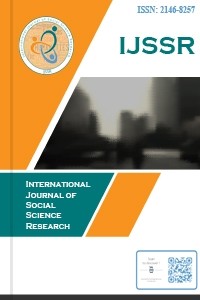Spor Bilimleri Alanında Öğrenim Gören Lisansüstü Öğrencilerinin Tükenmişliği Üzerinde Mobbingin Rolü
Mobbing
The Role of Mobbing Behaviors on the Burnout of Graduate Students in Sport Science
Mobbing, Burnout, Graduate student University,
___
- Akın, U. & Oğuz, E. (2010). Öğretmenlerin işkoliklik ve tükenmişlik düzeylerinin ilişkisi ve çeşitli değişkenler açısından incelenmesi. Kuram ve Uygulamada Eğitim Yönetimi, 16(3), 309-327.
- Amani., D. (2022). I have to choose this university: Understanding perceived usefulness of word of mouth (WOM) in choosing universities among students of higher education. Services Marketing Quarterly, 43(1), 1-16. DOI: 10.1080/15332969.2021.1982851
- Brislin, R.W. (1970). Back-translation for cross-cultural research. Journal of Cross-cultural Psychology, 1, 187-216. DOI: 10.1177/135910457000100301
- Cooke, D. K., Sims, R. L. & Peyrefitte, J. (1995). The relationship between graduate student attitudes and attrition. The Journal of Psychology, 129, 677-688. DOI: 10.1080/00223980.1995.9914938
- Daugherty, T. K. & Lane, E. J. (1999). A longitudinal study of academic and social predictors of college attrition. Social Behavior and Personality: An International Journal, 27, 355-361. DOI: 10.2224/sbp.1999.27.4.355
- Duyan, M. (2020). The effect of mobbing behaviors on students’ burnout: Empirical results from a Higher Educational Institution. African Educational Research Journal, 8(3), 519-524. DOI: 10.30918/AERJ.83.20.096
- Erdirençelebi, M. & Filizöz, B. (2016). Mobbingin etik iklim ve çalışanların işten ayrılma niyeti üzerine etkileri. Selçuk Üniversitesi Sosyal Bilimler Enstitüsü Dergisi, 35, 127-139.
- Goodboy, A., Martin, M. & Johnson, Z. (2015). The relationships between workplace bullying by graduate faculty with graduate students’ burnout and organizational citizenship behaviors. Communication Research Reports, 32(3), 272-280. DOI: 10.1080/08824096.2015.1052904
- Gün, G. (2016). Otel işletmelerinde mobbing ve iş tatmini ilişkisi. Bitlis Eren Üniversitesi Sosyal Bilimler Enstitüsü Dergisi, 5, 81-96.
- Heinemann, P. (1972). Mobbning – Gruppvåld bland barn och vuxna (Mobbing – Group Violence by Children and Adults), Natur and Kultur, Stockholm.
- Kara, D., Kim, H. & Uysal, M. (2018). The effect of manager mobbing behaviour on female employees’ quality of life. Current Issues in Tourism, 21(13), 1453-1467. DOI: 10.1080/13683500.2015.1078298
- Karık, T. & Yıldız, S.M. (2015). Mobbing davranışlarının kadın basketbolcuların tükenmişliği üzerine etkisi. Uluslararası İnsan Bilimleri Dergisi, 12(2), 430-442.
- Lewis, D. (2004) Bullying at work: the impact of shame among university and college lecturers. British Journal of Guidance & Counselling, 32(3), 281-299. DOI: 10.1080/03069880410001723521
- Leymann, H. (1996). The content and development of mobbing at work. European Journal of Work and Organizational Psychology, 5(2), 165-184.
- Lorenz, K. (1963). On Aggression. San Diego, CA: Harcourt Brace. Maslach, C. & Jackson, S.E. (1981). The measurement of experienced burnout. Journal of Occupational Behavior, 2, 99-113. DOI: 10.1002/job.4030020205
- Maslach, C. (2003). Job burnout: New directions in research and intervention. Current Directions in Psychological Science, 12(5), 189-192. DOI: 10.1111/1467-8721.012
- Nielsen, M. B. & Einarsen, S. (2012). Outcomes of exposure to workplace bullying: A meta-analytic review. Work & Stress, 26, 309-332. DOI: 10.1080/02678373.2012.734709
- Pheko, M.M. (2018). Autoethnography and cognitive adaptation: Two powerful buffers against the negative consequences of workplace bullying and academic mobbing. International Journal of Qualitative Studies on Health and Well-being, 13, 1459134. DOI: 10.1080/17482631.2018.1459134
- Schaufeli, W.B., Martínez, I.M., Pinto, A.M., Salanova, M. & Bakker, A.B. (2002). Burnout and engagement in university students: A Cross-National study. Journal of Cross-Cultural Psychology, 33(5), 464-481. DOI: 10.1177/002202210203300500
- Schaufeli, W.B. & Taris, T.W. (2005). The conceptualization and measurement of burnout: Common ground and worlds apart. Work & Stress, 19(3), 256-262. DOI: 10.1080/02678370500385913
- Taştan, N. & Gökler, R. (2017). Öğrenci görüşlerine göre siber-zorbalık ve okul tükenmişliği arasındaki ilişki. Uluslararası Sosyal Araştırmalar Dergisi, 10(54), 771-777. DOI: 10.17719/jisr.20175434644
- Thomas, C.H. & Lankau, M.J. (2009). Preventing burnout: The effects of LMX and mentoring on socialization, role stress, and burnout. Human Resource Management, 48(3), 417-432. DOI: 10.1002/hrm.20288
- Vveinhardt, J., Fominiene, V.B. & Jeseviciute-Ufartiene, L. (2018). Bullying and harassment as antisocial behaviours: socio-economic aspects of their impact assessment. Engineering Economics, 29(5), 548-558. DOI: 10.5755/j01.ee.29.5.19973
- www.ilo.org Report V (1) Ending violence and harassment against women and men in the world of work. International Labour Conference, Geneva, Switzerland, 107th Session, 2018.
- Walburg, V. (2014). Burnout among high school students: A literature review. Children and Youth Services Review, 42, 28-33. DOI: 10.1016/j.childyouth.2014.03.020
- Yang, H-J. (2004). Factors affecting student burnout and academic achievement in multiple enrollment programs in Taiwan’s technical–vocational colleges. International Journal of Educational Development, 24, 283-301. DOI: 10.1016/j.ijedudev.2003.12.001
- Yıldız, S.M. (2016). İşyerinde mobbing davranışlarının spor ve fiziksel etkinlik işletmeleri çalışanlarının örgütsel vatandaşlık davranışına etkisi. Dokuz Eylül Üniversitesi Sosyal Bilimler Enstitüsü Dergisi, 18(1), 165-180. DOI: 10.16953/deusbed.80977
- Yıldız, S.M. (2017). Örgütsel davranış seçme konular. Ankara: Detay Yayınevi.
- Yildiz, S.M. (2020). The effect of mobbing behaviors on students’ burnout: An empirical study on undergraduate students of the faculty of sports sciences. Journal of Sport Sciences Research, 5(1), 1-14. DOI: 10.25307/jssr.640401
- Yayın Aralığı: Yılda 2 Sayı
- Başlangıç: 2012
- Yayıncı: Şahin ORUÇ
Spor Bilimleri Alanında Öğrenim Gören Lisansüstü Öğrencilerinin Tükenmişliği Üzerinde Mobbingin Rolü
Biçimlendirici Öğrenme Modeli ve Türkiye’de Uygulanabilirliği Üzerine Bir Değerlendirme
Furkan İlker AKIN, Mustafa ŞEKER
Sosyal Bilgiler Öğretmenlerinin Küresel Vatandaşlık Eğitimi ile İlgili Görüşlerinin İncelenmesi
Yerel Halkın Bakış Açısından Antalya’da Turizm ve Etkilerinin İncelenmesi
Ortaöğretim Öğrencileri İçin Görsel Okuryazarlık Ölçeği Geliştirme Çalışması
Siyasal Gelişmeler Işığında Qian Jin Prensesin Göktürk Kağanlarıyla Evlilikleri ve Heqin Politikası
Sosyal Bilimlerde Nicel Araştırma Geleneği Üzerine Kuramsal Bir İnceleme
İlkokul Öğrencilerinin Yazma Hızları ve Hataları
Ortaokul Öğrencilerinin Bireysel ve Sosyal Sorumluluk Düzeylerinin İncelenmesi
Melike COŞKUN, Hüseyin ÇALIŞKAN, Tamer TERZİ
